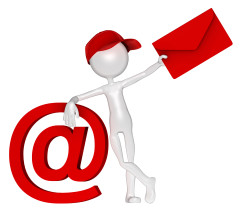 In my one-to-one work with writers and as an editor for a print publication and several e-newsletters, I receive a constant flow of email and other communications. I love hearing from you! But I often imagine what it would be like for an agent, publisher, or magazine editor who is dealing with hundreds of queries a day to receive some of the troublesome and vague communications I receive.
In my one-to-one work with writers and as an editor for a print publication and several e-newsletters, I receive a constant flow of email and other communications. I love hearing from you! But I often imagine what it would be like for an agent, publisher, or magazine editor who is dealing with hundreds of queries a day to receive some of the troublesome and vague communications I receive.
Let me tell you something. Because we’re bombarded from all sides with email, social media, and texts—crystal clear, well constructed communications are much more likely than the other kind to rise above the noise and be heard (read).
Do your communications with publishing industry professionals exhibit the same level of care you’ve put into your creative writing? How can even your most routine communications help you to be seen as a professional writer?
Don’t get too cute
Is the subject line or content of your email clever—or just inscrutable or spam-like? It’s the rare person who can pull off a good, attention-getting joke as a preface to more serious communication. Respect other people’s time. Write an email subject line that will clearly tell the recipient what your email is about. Then get down to business quickly and clearly in your email.
Use your words
Some of our necessarily abbreviated texting and social media ways have slopped over into other communications when the abbreviations offer no advantage. There’s nothing worse than receiving an email from someone you know is needing something, but you have no idea what. Be a good writer all the time and impress with your concise and clear prose.
Don’t use an email handle that’s silly
Or political, gobbledygook, or a double entendre. Why risk turning people off before they even read what you have to say? In addition, make sure your full name appears in your message “from” line. (Send yourself an email to check if you’re unsure what appears.) I’m surprised at how many people don’t show their full names—and then don’t sign their emails with their full names, either. Joe? Which Joe would that be?
Don’t use an address you share with a family member
Let me tell you from experience, hilarity and confusion and embarrassment can ensue.
Don’t use your work email address
An agent or a contest may not respond to you right away. Can you be sure you’ll be in the same job six months from now? Not only that, the industry professionals you’re trying to attract don’t need to receive your “out of office” messages.
Don’t use autoresponders
You wrote to me, and when I reply, I receive an automatic message that makes me fill out a form before my email is delivered to you, and it always takes me three or four tries with the captcha code to get through. I’m going to do it, because I want your business, but can you be sure that the agent who read your partial will? Autoresponders that say things like “thank you for your mail” are useless—and annoying. No one needs that extra, impersonal email.
Do not include your industry contacts in the distribution for your joke, religious, or political forwards, your holiday letter, or your social media invitations.
Just don’t. Keep your professional contacts separate.
Read and follow submission requirements
This might seem obvious, but you’d be surprised at how many people don’t. Whether you’re looking for an agent or publisher, submitting to a magazine, or entering a contest you disqualify yourself by not following instructions to the letter. Check and re-check submissions before you send them. And do your research! Don’t be asking an agent on Twitter questions about her interests when the answers can be found on her website.
Remember, every communication with an agent, publisher, or magazine editor is an opportunity to increase your name recognition and demonstrate that you’re the type of individual they’d love to work with. (The admonition to “show” rather than “tell” works for communications, too. Take full advantage of every opportunity to impress your industry contacts with with your professionalism.
